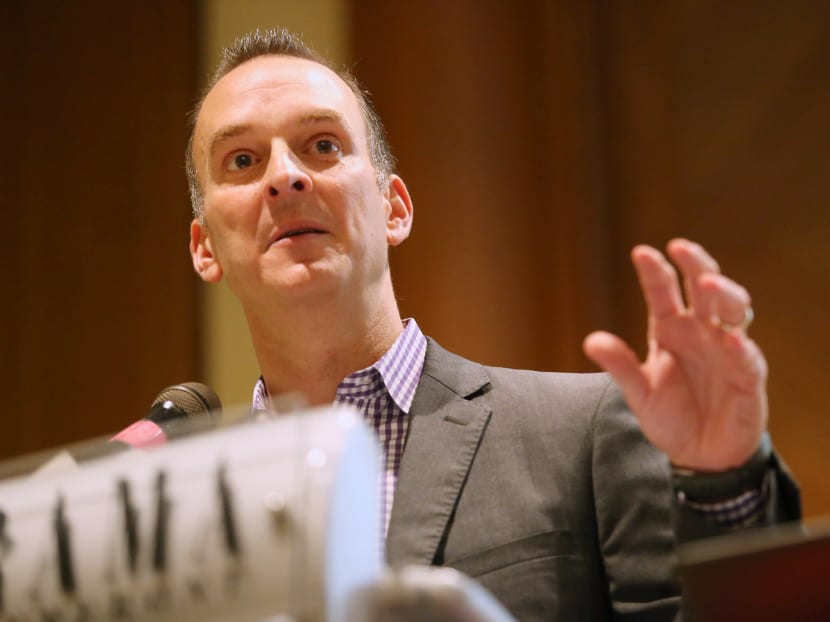Cycling’s coming clean
SINGAPORE — The fiery battle with cycling’s biggest superstar made Travis Tygart a famous face in international sport.

US Anti-Doping Agency CEO Travis Tygart speaking at the Anti-Doping Intelligence and Investigation Seminar yesterday. Photo: Ernest Chua
SINGAPORE — The fiery battle with cycling’s biggest superstar made Travis Tygart a famous face in international sport.
In August 2012, the United States Anti-Doping Agency (USADA) — which Tygart heads as its chief executive officer — stripped Lance Armstrong of his seven Tour de France titles, and slapped him with a lifetime ban for engaging in what they called “the most sophisticated, professionalised and successful doping programme the sport has ever seen.”
Subject to death threats and hate mail from Armstrong supporters for what the disgraced cyclist called an “unconstitutional witch hunt”, Tygart and his team held firm. But he insists he is no superstar.
“Lance’s decisions, ultimately he was held accountable to them. It was not us that brought him down, it was his decision to fraud the world, we simply did our job,” said Tygart, 44, who is in Singapore for the Anti-Doping Intelligence and Investigation Seminar at the Furama Riverfront Hotel, yesterday.
“This is an important fight for clean athletes. It’s a huge obligation and I’m thankful that clean athletes have confidence in me to lead this.”
With a new man at the helm of the Union Cycliste Internationale (UCI) — Brian Cookson ousted former chief Pat McQuaid last September — and key reforms being laid out, Tygart is confident the sport’s professional ranks is finally on the right path after decades of widespread doping.
“I think there’s a whole lot to be hopeful for ... the commitment to setting up a structure in addition to individual people in leadership positions that will have a dramatic change on the culture for the good of clean sport,” said Tygart.
“No longer are we going to tolerate an overwhelming majority of the pro peloton easily justifying using performance enhancing drugs to create a corrupt culture where they have to use drugs in order to win. I think those days are gone.”
While several high profile doping cases have hit the news recently, including swimmers Sun Yang of China and South Korea’s Park Tae Hwan, and badminton world No 1 Lee Chong Wei testing positive for banned substances, Tygart believes Olympic sports are sound.
“It’s easy to blame a few bad apples for the whole culture (of doping),” he said. “I firmly believe that today Olympic sport is as clean as it’s ever been. The temptation is as high as it’s ever been ... but within the Olympic movement, athletes are held to the WADA (World Anti-Doping Agency) code.”
Tygart, who joined USADA as its legal director in 2002 before becoming chief executive in 2007, described WADA’s investigation into claims of systematic doping among Russian track and field athletes a “defining moment” in protecting the rights of clean athletes, he criticised the doping programmes of mixed martial arts, which had been hit by recent doping scandals, and the US National Collegiate of Athletic Associations, and also expressed concern about sports with “no testing”.
Tygart added: “Then you look at the youth level because the pressures to win are so huge ... unless there’s some mechanism in place that supports their decision not to do drugs, and that mechanism is them being held accountable.
However, Tygart believes getting law enforcement agencies involved may not always be the solution.
“You have to realistic about the priority of government law enforcement in the age of terrorism, drug smuggling ... you would hate to see doping on their plate and be at the very bottom of the totem pole,” he said. “I don’t see it happening in the US anytime soon, and part of it is the success in the (USADA) cycling investigation.”
Yesterday’s seminar saw Tygart sharing his expertise and experiences with participants from different countries.
The US doping chief also gave Singapore’s introduction of blood testing at June’s SEA Games — a first in the regional Games’ history — the thumbs up.
But he stressed: “It’s also about maintaining vigilance ... once it’s over, it’s sustaining the commitment and it’s a long-term one. We’ve been doing it for 15 years and there are still areas to improve.”





